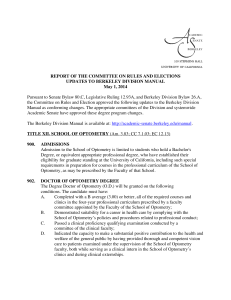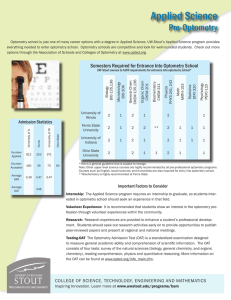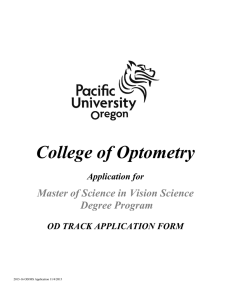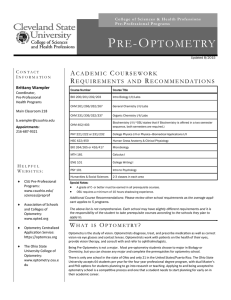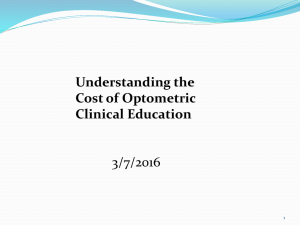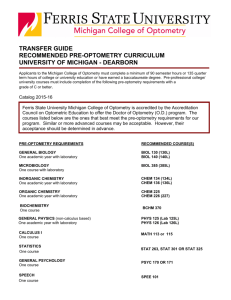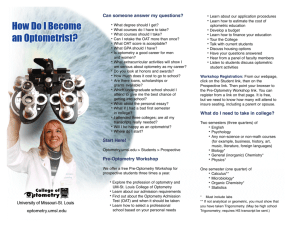Optometry
advertisement
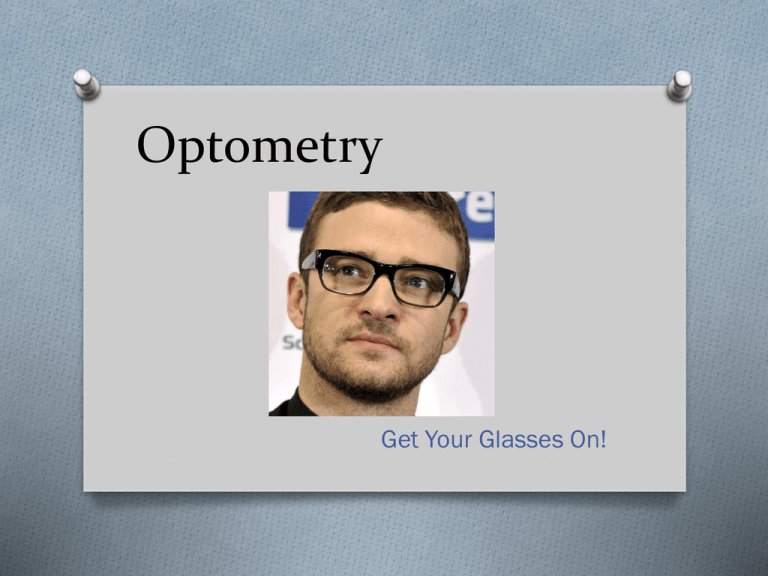
Optometry Get Your Glasses On! What IS an Optometrist? O An optometrist has an O.D. (Oculus Doctor). O O.D.’s can: O Examine/diagnose patients O Prescribe meds, eye glasses or contacts, vision therapy O perform certain eye surgeries (depending on state regulations) How do you get there? O The requirements are similar to those for medical school. O 3-4 years (usually) of undergraduate education with a strong science background O An undergraduate degree is required, so this really depends on how long it takes to get your degree. O 4 years of graduate education at a school of optometry O Pass board exams (administered by the National Board of Examiners in Optometry) O Specialization! Further education in particular areas (e.g. ocular pathology) How do you get there? part 2 O There are 19 schools of Optometry (currently) in the U.S. O Admission to these schools is competitive with about 1 out of 3 applicants being accepted. O Applicants take the OAT (Optometry Admissions Test), a standardized test covering natural sciences, reading comprehension, physics, and qualitative reasoning. Cost and Salary O Optometry schools can cost $9,312 to $22,470 for residents and up to $51,420 for non-residents O Some schools have programs allowing non- residents to pay the resident tuition. O There are many loan options and grants to help students pay for their education. O 2009 average net income for primary care optometrists was $130,856 The Job O Most optometrists work in private practices (and therefore need to be business savvy). O Many patients come in to be fitted for glasses/contacts, but other problems (think glaucoma and cataracts) are treated as well. O Optometrists may also do research (some go on to get Ph.D.’s for this). Professionalism O Candidates for optometry schools should have volunteering and shadowing experience. O “The purpose in shadowing an optometrist is to ensure that optometry is the profession for you.” – Berkeley School of Optometry O Other extra-curricular activities are considered on applications. O Optometry school students receive ethics education alongside their other classes. Resources O Bureau of Labor Statistics: O http://www.bls.gov/oco/ocos073.htm O Association of Schools and Colleges of Optometry: O http://www.opted.org/i4a/pages/index.cfm?pageid=3347 O Berkeley Optometry (be sure to check out the “etiquette” section under admissions for great advice): O http://optometry.berkeley.edu/index.html O USA News Best Careers of 2009: O http://money.usnews.com/money/careers/articles/2008 /12/11/best-careers-2009-optometrist Questions? O What do you think would be most interesting about this type of work? O What would be the most difficult part of this job for you? Why? O How would you go about preparing yourself for this profession? O What’s your favorite part of the eye?
